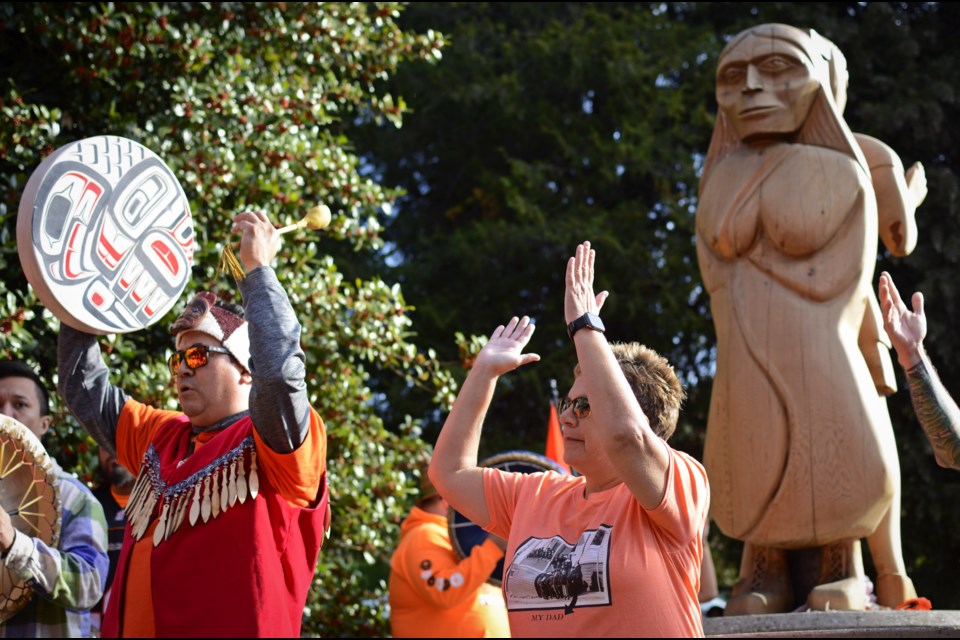Before the Tsleil-Waututh community set off on its pilgrimage from the former site of St. Paul’s Residential School, Sxwíxwtn (Wilson Williams) acknowledged the children who would be walking the path.
“Today, the walk signifies the path our residential school students took to go to school,” the Sḵwx̱wú7mesh Úxwumixw (Squamish Nation) councillor said Friday, on the National Day for Truth and Reconciliation. “Last year was from the village. Today it's from the school back to the village.”
Wilson said he was asked to speak there as a messenger to provide love and respect to the community members present – most importantly, to the survivors of the school.
“Chén̓chenstway: let's hold each other up,” he said. “Let's show that path today and tomorrow that our mén̓men (children) could stand tall and use their voice. They are the leaders of tomorrow.”
As he spoke to a crowd of hundreds of orange shirts, the morning sun shone on a memorial carving behind him that honours the more than 2,000 children from the Squamish, Tsleil-Waututh, shíshálh (Sechelt) and xʷməθkʷəy̓əm (Musqueam) Nations who were taken from their parents and forced to live at St. Paul’s.
St. Paul's opened in 1899, and was replaced by St. Thomas Aquinas Regional Secondary School in 1959.
To commemorate Truth and Reconciliation Day, Tsleil-Waututh members and guests walked the 8.5-kilometre pilgrimage from the 500 block of West Keith Road in North Vancouver back to the community’s reserve.
The main idea behind the walk is lifting up their Elders, said Tsleil-Waututh Nation councillor Kevin O’Neill.
“It's a long healing journey for Elders,” he said. “I see the sparkle in their eyes again, when they know that their community is helping lift them up, helping them heal from the trauma of residential schools.”
While slow steps are being made towards reconciliation, O’Neill said that seeing people on the sides of the road cheering his community on is one of the small wins that really help to fuel their spirits.
When thinking about truth and reconciliation, he said that one important thing non-Indigenous friends and allies can do is learn from Indigenous Elders.
“When we are giving you a teaching, it's a way to help you grow, helping you learn about the past, and how you can be stronger with us,” he said. “It comes down to just really listening to what they're saying, because one thing will stick with you. And you just have to remember that one thing.”
Tsleil-Waututh Chief Jen Thomas said the pilgrimage means a lot to her, because her dad – who made the inaugural walk last year, and again this year – had to make the trip as a young child attending St. Paul’s.
“We're retracing his steps,” she said. “We're acknowledging his path. We're honouring him and others, the survivors and the ones who aren't with us.”
One of her grandsons is six years old, the same age her dad was when he was at the residential school, which later became a day school. “I can't even imagine the pain – having your child removed and sent somewhere, so it really hits home when you actually think of somebody that age.”
Her father, Stan Thomas, said he couldn’t understand why he had to stay at the school when his home was only five miles away.
Other parts of the experience were confusing as well. “I knew more Latin that my own language, because we attended Catholic church three times a week,” he said. “So Latin came pretty fluently rather than our own traditional language.”
He recalls other painful memories from St. Paul’s. “My cousin and I were caught talking when we were sent to bed at 7:30 p.m. – It was still daylight,” Thomas said.
“We were put in the hallway overnight and forgotten about. We spent seven hours in the hallway on our knees sleeping against the closets.”
When he attended the pilgrimage last year, Thomas said he was overwhelmed with emotion as old memories came flooding back. But he also felt the strength of the community, a feeling he felt again this year.
“To see all the support that they give to us” he said. “It's a nice feeling.”
To make a donation to Tsleil-Waututh residential and day school survivors, visit the Nation's website.
[email protected]
twitter.com/nick_laba



